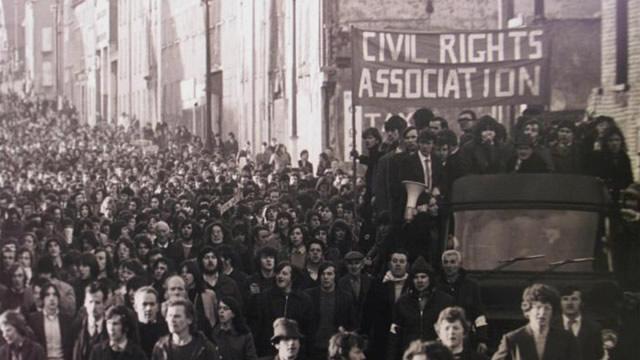
Report from the High Court today where Madden & Finucane secured £350,000 damages for Bloody Sunday victim Joe Friel.
A man shot in the chest by a British soldier as he tried to run to safety on Bloody Sunday is to receive £350,000 compensation.
The settlement was reached at the High Court in 68-year-old Joe Friel’s claim for injuries and false allegations that he had been an armed terrorist when paratroopers opened fire in Derry in January 1972.
His lawyers described it as a “blatant, malicious and outrageous lie” which persisted until he was publicly exonerated more than 40 years later.
The payout also covers loss of earnings after he was forced to retire early from his job as a tax official due to deteriorating health.
A judge expressed hope that the resolution in the action against the Ministry of Defence (MoD) will enable the father-of-three to obtain some degree of closure.
Thirteen unarmed people were killed by soldiers during a civil rights demonstration in the city.
One of the others wounded on the day, which became known as Bloody Sunday, died later.
In 2010 the Saville Inquiry into the shootings established the innocence of all of the victims.
Those findings led to David Cameron, the British Prime Minister at the time, issuing a public apology for the soldiers’ actions.
He described the killings as “unjustified and unjustifiable”.
Nearly £3 million has now been paid out in a series of settlements and awards made in claims against the MoD on behalf of those bereaved or injured.
With liability accepted in all cases, proceedings brought by Mr Friel centred on the level of damages.
Aged 20 on Bloody Sunday, he was shot at Glenfada Park as he tried to escape the gunfire.
The court heard he suffered chest wounds and was carried to a house where he remembers women saying the rosary, leaving him terrified that he was going to die.
Soldiers then stopped the car being used to transport him to hospital, striking the driver on the head with a rifle butt and firing a plastic baton round at another passenger who fled, it was contended.
A member of the Royal Anglian Regiment, known as Lance Corporal 104, who took the car to a military aid post later alleged Mr Friel admitted to him that he had been carrying a gun that day.
Brian Fee QC, for the plaintiff, said: “This was a blatant, malicious and outrageous lie, but it was one which was relied upon by the defendant for over 40 years until it was conclusively dismissed by Lord Saville’s report in 2010.”
Eventually Mr Friel was brought to Altnagelvin Hospital, where he was twice administered the Last Rites due to his condition.
During a two-week period of treatment he watched the funerals of some of those who were killed on a television rigged up with a coat hanger for an aerial.
Mr Fee insisted the false claim that his client had been an admitted gunman on Bloody Sunday formed part of the defendant’s propaganda war, adding to the general vilification of those who had been shot.
With Mr Friel unable to work since his medical retirement in 1992, the court was told he still has a degree of anger and resentment at what happened.
“He was alleged to have been an armed terrorist on Bloody Sunday,” Mr Fee said.
“The allegation that Joe Friel admitted he had a gun was a carefully targeted, specific, malicious lie.”
Counsel also described how Lance Corporal 104 went abroad without attending the Saville Inquiry, avoiding “what should have been the day of reckoning”.
Following his opening of the case further discussions led to an announcement of the resolution reached.
“The action is now settled for £350,000 and costs,” Mr Fee confirmed.
Mr Justice McAlinden welcomed the outcome reached in what he said was a “very significant and very sad case”.
He added: “I know it’s an easy thing to say, but I hope this aspect of the case, the compensation claim, eventually enables (Mr Friel) to obtain some degree of closure.”
Outside court Mr Friel’s solicitor, Fearghal Shiels of Madden & Finucane, said the action was unique among the Bloody Sunday litigation.
“He was the only one of those shot and injured against whom soldiers maintained an allegation that he was shot whilst handling a firearm,” the lawyer said.
“That was a malicious lie which was peddled by the British Army before the Widgery Inquiry in 1972 and again before the Saville Inquiry.
“Ultimately the soldier who made the allegation failed to attend to have his evidence tested, although it was not until the publication of the Saville Report that Mr Friel was finally exonerated.”
You must be logged in to post a comment.